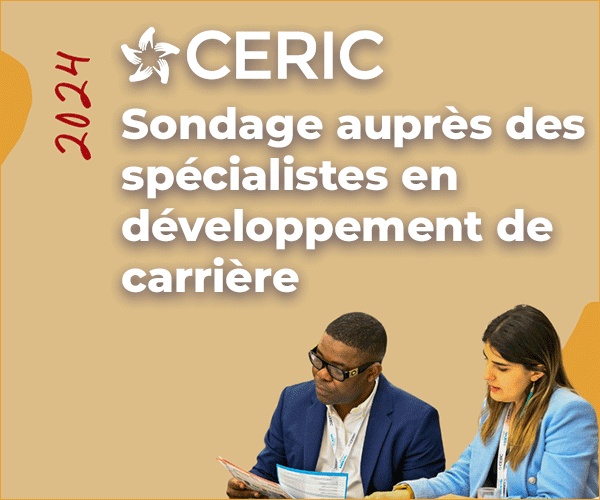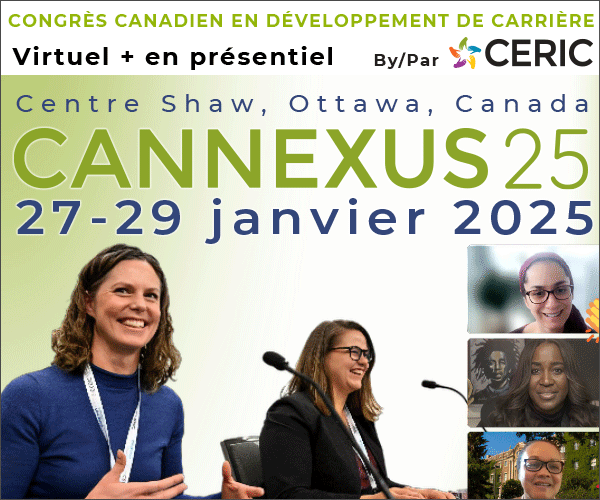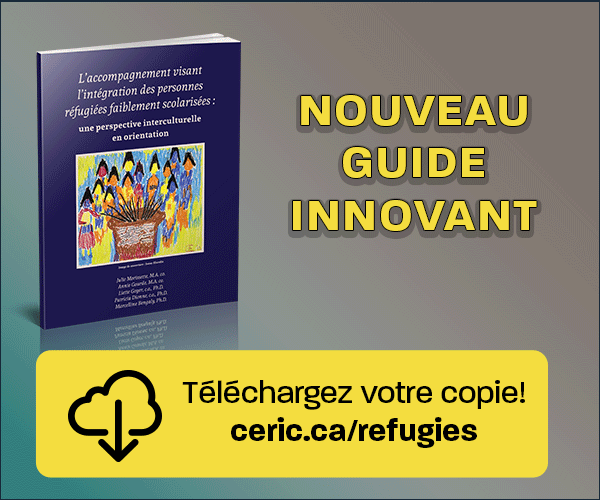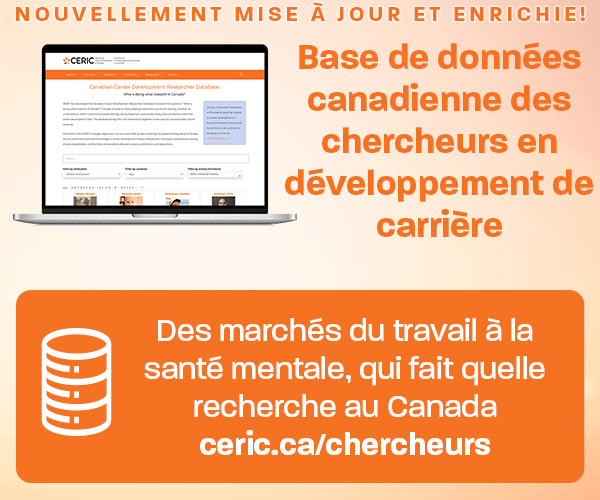Ce n'est pas aussi facile qu'on le dit : le point de vue des étudiants étrangers sur l'acquisition d'une expérience de travail au Canada
DOI :
https://doi.org/10.53379/cjcd.2022.344Mots-clés :
étudiants internationaux, employabilité, incidents critiques, les transitions de carrièreRésumé
Cette étude donne un aperçu des perspectives des étudiants internationaux en matière de préparation à l'entrée sur le marché du travail canadien. Du point de vue du capital humain, les étudiants étrangers sont des ressources précieuses pour le marché du travail canadien et d'autres pays où la population est en déclin. Cependant, la plupart des recherches sur les étudiants internationaux se sont concentrées sur leur expérience de transition initiale, et les recherches disponibles sur leurs expériences d'emploi se limitent souvent à la transition post-diplôme. Les étudiants internationaux doivent renforcer leur capacité d'emploi en même temps qu'ils étudient, en acquérant une expérience professionnelle locale. Dans cet article, nous présentons une analyse des incidents critiques recueillis auprès d'étudiants internationaux qui met en évidence cinq obstacles clés dans leur expérience du contexte de travail canadien, notamment les politiques et procédures, la concurrence et les conditions économiques, les défis pour naviguer dans les normes culturelles locales, les capacités linguistiques et leurs circonstances de vie personnelles. La discussion établit des liens entre le recrutement des étudiants internationaux et leurs objectifs à plus long terme de résidence au Canada, avec des recommandations pour l'établissement de ponts entre les politiques et les services.
Références
Arthur, N. (2013). International students and career development: Human capital in the global skills race. Journal of the National Institute for Career Education and Counselling, 31(1), 43-50. https://doi.org/10.20856/jnicec.3108
Arthur, N. (2017). Supporting international students through strengthening their social resources. Studies in Higher Education, 42, 887-894. https://doi.org/10.1080/03075079.2017.1293876
Arthur, N. & Flynn, S. (2011). Career development influences of international students who pursue permanent immigration to Canada. International Journal for Educational and Vocational Guidance, 11, 221-236. https://doi.org/10.1007/s10775-011-9212-5
Balin, E., Anderson, N. M., Chudasama, S. Y., Kanagasingam, S. K., & Zhang, L. (2016). Working with international students in the U.S. and beyond: A summary of survey research by NCDA International Student Services Committee. Journal of International Students, 6(4), 1053–1061. https://doi.org/10.32674/jis.v6i4.335
Becker, G. S. (1993). Nobel lecture: The economic way of looking at behavior. Journal of Political Economy, 101, 385–409. https://www.jstor.org/stable/2138769
Berquist, B., Hall, R., Morris-Lange, S., Shields, H., Stern, V., & Tran, L. T. (2019). Global perspectives on international student employability. International Education Association of Australia (IEAA). https://www.ieaa.org.au/documents/item/1586
Bond, S., Areepattamannil, S., Brathwaite-Sturgeon, G., Hayle, E., & Malekan, M. (2007). Northern lights: International graduates of Canadian institutions. Canadian Bureau for International Education. http://en.copian.ca/library/research/ccl/northern_lights/northern_lights.pdf
Butterfield, L. D., Borgen, W. A., Maglio, A. T., & Amundson, N. E. (2009). Using the enhanced critical incident technique in counselling psychology research. Canadian Journal of Counselling, 43, 4, 265-282. https://cjc-rcc.ucalgary.ca/article/view/58863
Canadian Bureau for International Education [CBIE]. (2021). Infographic. https://cbie.ca/infographic/
Choi, Y., Crossman, E., & Hou, F. (2021). International students as a source of labour supply: Retention in province of study. Economic and Social Reports, Catalogue no. 36-28-0001. Statistics Canada. https://doi.org/10.25318/36280001202100600003-eng
Coffey, J., Farivar, F., & Cameron, R. (2018): The job seeking experiences of international graduates in the host country: Australia’s lost opportunity? The International Journal of Human Resource Management. https://doi.org/10.1080/09585192.2018.1504106
Crossman, E., Choi, Y., & Hou, F. (2021). International students as a source of labour supply: The growing number of international students and their changing sociodemographic characteristics. Economic and Social Reports, Catalogue no. 36-28-0001. Statistics Canada.
Crossman, E., Choi, Y., Lu, Y., & Hou, F. (2022). International students as a source of labour supply: A summary of recent trends. Economic and Social Reports, Catalogue no. 36-28-0001. Statistics Canada. https://doi..25318/36280001202200300001-eng
Dam, H., Chan, J. & Wayland, S. (2018). Missed opportunity: International students in Canada face barriers to permanent residence. Journal of International Migration & Integration 19, 891–903. https://doi.org/10.1007/s12134-018-0576-y
Donovan, M. (2016, March 16). John McCallum pledges to make immigration easier for international students. CBC News. https://www.cbc.ca/news/canada/nova-scotia/immigration-canada-international-students-easier-1.3492851
Dumont, J-C., & Liebig, T. (2014). Is migration good for the economy? OECD Migration Policy Debates. https://www.oecd.org/els/mig/OECD%20Migration%20Policy%20Debates%20Numero%202.pdf
Esses, V., Sutter, A., Ortiz, A., Luo, N., Cui, J., & Deacon, L. (2018). Retaining international students in Canada post-graduation: Understanding the motivations and drivers of the decision to stay. Canadian Bureau for International Education. http://voiesversprosperite.ca/wp-content/blogs.dir/1/files/2019/02/Retaining-International-Students-in-Canada-Post-Graduation.pdf
Frenette, M., Lu, Y., & Chan, W. (2019). The postsecondary experience and early labour market outcomes of international study permit holders. Statistics Canada. https://www150.statcan.gc.ca/n1/pub/11f0019m/11f0019m2019019-eng.htm
Germain, A., & Vultur, M. (2016). Entre mobilité et ancrage: Les étudiants internationaux à l'INRS [Between mobility and anchoring: International students at the INRS]. Centre Urbanisation Culture Société. http://espace.inrs.ca/id/eprint/3344
Global Affairs Canada. (2019). Building on success: International education strategy, 2019-2024. Catalogue No: FR5-165/2019E-PDF. https://www.international.gc.ca/education/assets/pdfs/ies-sei/Building-on-Success-International-Education-Strategy-2019-2024.pdf
Government of Canada. (2021). Post-graduation work permit program (PGWPP): COVID-19 program delivery. https://www.canada.ca/en/immigration-refugees-citizenship/corporate/publications-manuals/operational-bulletins-manuals/service-delivery/coronavirus/temporary-residence/study-permit/pgwpp.html
Hawthorne, L. (2014). Indian students and the evolution of the study‐migration pathway in
Australia. International Migration, 52(2), 3–19. https://doi.org/10.1111/imig.12110
ICEF Monitor. (2021). Mapping COVID-19’s impact on global student mobility. https://monitor.icef.com/2021/09/mapping-covid-19s-impact-on-global-student-mobility/
Jones. E. (2017). Problematising and reimagining the notion of ‘international student experience’, Studies in Higher Education, 42, 933-943. http://dx.doi.org/10.1080/03075079.2017.1293880
Kaushik, V., & Walsh, C. A. (2019). Pragmatism as a research paradigm and its implications for social work research. Social Sciences, 8(9), 255-272. https://doi.org/10.3390/socsci8090255
Khanal, J., & Gaulee, U. (2019). Challenges of international students from pre-peparture to post-study: A literature review. Journal of International Students, 9(2), 560–581. https://doi.org/10.32674/jis.v9i2.673
McDaniel, M. M., Borgen, W. A., Buchanan, M. J., Butterfield, L. D., & Amundson, N. E. (2020). The philosophical underpinnings of the Enhanced Critical Incident Technique. Canadian Journal of Counselling and Psychotherapy, 54(4), 738–755. https://doi.org/10.47634/cjcp.v54i4.68139
Netierman, E., Harrison, L., Freeman, A. Shoyele, G., Esses, V., & Covell, C. (2021). Should I stay or should I go? International students’ decision-making about staying in Canada. Journal of International Migration & Integration. https://doi.org/10.1007/s12134-021-00825-1
Nguyen, T., & Hartz, D. (2020). International students in Australia, employability and cultural competence. In: J. Frawley, G. Russell, & J. Sherwood (Eds.), Cultural competence and the higher education sector. Springer, Singapore. https://doi.org/10.1007/978-981-15-5362-2_18
Nilsson, P. A., & Ripmeester, N. (2016). International student expectations: Career opportunities and employability. Journal of International Students, 6, 614-631. https://doi.org/10.32674/jis.v6i2.373
Nunes, S. & Arthur, N. (2013), International students’ experiences of integrating into the workforce. Journal of Employment Counseling, 50, 34-45. http://doi.org/10.1002/j.2161-1920.2013.00023.x
Popadiuk, N. & Arthur, N. (2014). Key relationships for international student university-to work transitions. Journal of Career Development, 41, 122-140. http://doi.org/10.1177/0894845313481851
Statistics Canada. (2012). Definition of ‘international student’. Education Matters: Insights on Education, Learning and Training in Canada. https://www150.statcan.gc.ca/n1/pub/81-004-x/2010006/def/intlstudent-etudiantetranger-eng.htm
Tan, E. (2014). Human capital theory: A holistic criticism. Review of Educational Research. 84, 411-445. https://doi.org/10.3102/0034654314532696
Viergever, R. F. (2019). The critical incident technique: Method or methodology? Qualitative Health Research, 29, 1065–1079. https://doi.org/10.1177/1049732318813112
Walsworth, S., Somerville, K., & Robinson, O. (2021). The importance of weak friendships for international student satisfaction: Empirical evidence from Canada. International Journal of Intercultural Relations, 80, 134-146. https://doi.org/10.1016/j.ijintrel.2020.11.004
Woodend, J. (2018). Context and practices of university student services for international students’ workforce integration: Research-in-brief. Canadian Journal of Career Development, 17(2), 113-116. https://cjcd-rcdc.ceric.ca/index.php/cjcd/article/view/84
Woodend, J., & Arthur, N. (2018). International students’ university-to-work transition: Research-in-brief. Canadian Journal of Career Development, 17(1), 53-55. https://cjcd-rcdc.ceric.ca/index.php/cjcd/article/view/107
Ziguras, C., & Law, S. (2006). Recruiting international students as skilled immigrants: The global “skills race” as viewed from Australia and Malaysia. Globalisation, Societies, and Education, 4, 59–76. https://doi.org/10.1080/14767720600555087

Téléchargements
Publié-e
Comment citer
Numéro
Rubrique
Licence
(c) Tous droits réservés La Revue canadienne de développement de carrière 2022

Cette œuvre est sous licence Creative Commons Attribution - Pas d'Utilisation Commerciale - Pas de Modification 4.0 International.












